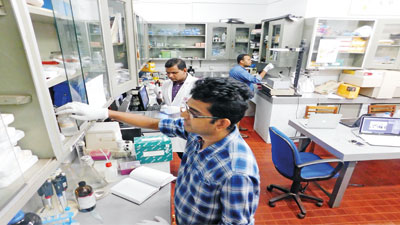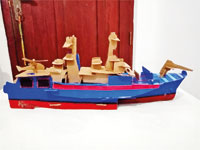Running in the family: Have you inherited a genetic disease?

The team at work in the ICIBN of the Sri Jayewardenepura University
Their firstborn son, Sunil* was fine till he was about five years old. It was when father and son went to a nearby ground in Gampaha to play, run around and cycle that the father found his son to be a little kammeli (lazy).
“Sunil just couldn’t run much but would collapse on the ground with the excuse ‘mata mahansi’ (I am tired),” recalls the father, much later realising that even when getting off the bed, his son would hold onto a chair.
The father and the mother did take their precious son to a doctor nearby who ordered an X-ray and on finding that nothing was wrong with his legs, prescribed some vitamins. But to no avail.
They then went to the Lady Ridgeway Hospital (LRH) for Children, Colombo, and what they heard from the doctors sent them into heartrending shock……“Jeevithe kadang wetuna,” says the father, explaining that their life collapsed.
Many alternative medicines, they tried, and ultimately decided that the treatment and management plan of the LRH doctors and the support of the Sri Jayewardenepura University were the best, while accepting the reality of Sunil’s condition.
Now Sunil is 12, attending school and also following a routine of physiotherapy daily. What the future holds, they know not, but live for the day elated at the creativity and humanity of their son and marvelling at the bond between him and his younger sister.
Sunil is afflicted with Duchenne Muscular Dystrophy (DMD – an inherited genetic disease which leads to muscle weakness and loss).
Far away, in a home in Galle, 47-year-old Roshan is wasting away. When Anoma* married him, he was fine. A jewellery craftsman, they had two daughters and built themselves a home.
Roshan was very active then, sighs Anoma. It was only gradually that she noticed “podi wenaskam” (small changes). He did not touch alcohol but seemed as if he was very wela (drunk) when cycling to the boutique close-by. There were major balancing issues and now he is restricted to a wheelchair.

Some of the patients for whom free genetic testing has been carried out at the ICIBN
His family took him to the Karapitiya Hospital and the doctors who diagnosed him with Spinocerebellar Ataxia (SCA – a genetic disorder characterized by progressively poor coordination), linked them with the Sri Jayewardenepura University.
These are just two families grappling with an inherited disease and the common weave running not only through these family tapestries but also numerous others is the Sri Jayewardenepura University’s Interdisciplinary Centre for Innovation in Biotechnology & Neuroscience (ICIBN) of the Faculty of Medical Sciences.
What ICIBN has offered these families is a confirmed diagnosis of their loved one’s illness through free genetic testing (molecular diagnostic services).
“These families were like abandoned children left to their own devices. When we looked at inherited diseases in Sri Lanka, we found that nobody gave them a confirmed diagnosis as treatment is not available for these illnesses. Until we came into the picture, there was only a clinical diagnosis based on the symptoms,” says the Director of ICIBN, Prof. Ranil de Silva, shedding light on their involvement in the lives of these hapless families.
Lamenting that inherited neuro-degenerative and neuro-muscular diseases such as DMD, SCA, Myopathy, Spinal Muscular Atrophy (SMA) and Huntington’s Disease do not get state funding, Prof. de Silva says that even though there is no treatment for them at the moment, these families have a right to know what is afflicting their loved one.
“They need a proper diagnosis and while holding onto a sliver of hope that gene therapy under clinical trials in developed countries would give a cure someday, at least these families can provide palliative care to their affected family member,” he says.
As genetic testing – almost non-existent in government hospitals and only available in a few private centres at a cost – is the gold standard, Prof. de Silva and his team including the final-year Ph.D scholars Nalaka Wijekoon and Lakmal Gonawala have carried out such testing on about 500 patients absolutely free of charge.
When asked what the purpose of such testing would be if there is no cure, quick is the reply from him.
“Yes, until a cure is found, they may die young. But tragically, they suffer and die. With a definitive diagnosis through genetic testing, we can make their lives comfortable,” he says, citing the case of a DMD sufferer who is prone to respiratory infections as the thoracic muscles are weak.

Prof. Ranil de Silva
He says that if the doctors know for sure what the disease is, they can prescribe certain medications such as prednisolone to control the symptoms and prolong life, along with physiotherapy for breathing exercises, which is exactly what 12-year-old Sunil is doing now.
“The suffering can be eased. We need to give them a chance to survive comfortably and who knows, one day there may be a cure through gene therapy,” he adds.
Prof. de Silva and his team have done extensive research in the country not only about the poverty aspects of these families but also the major psychosocial issues faced by them. They have found that genetic disorders create a “package of problems” including social and economic issues which, in turn, lead to the country having to bear these burdens as well.
Failed marriages, harassment, self-harm, children dropping out of school and patients being forced to live in filth and squalor are just the tip of the iceberg, it is understood.

The creative bent of 12-year-old Sunil
According to Prof. de Silva 7.6 million children are born annually with a severe genetic disorder or birth defect around the world, of whom nearly 95% are from developing countries.
“Through this work, we hope to give a clear message to all those families grappling with neglected inherited diseases that they can access free genetic testing,” he says, adding that these families can then think of genetic counselling and family planning.
The free genetic testing is being carried out from funds secured from international and local agencies and Prof. de Silva is appreciative of Consultant Neurologists/Paediatric Neurologists Dr. Sunethra Senanayake, Dr. Darshana Sirisena, Dr. Pyara Ratnayake, Dr. Harsha Gunasekara, Dr. Janaka Peries, Dr. Cryshanth Dalpatadu, Dr. Sanjaya Fernando, Dr. Dilum Palliyaguru, Dr. Athula Dissanayake and Dr. Ajantha Keshavaraj for referring their patients to the ICIBN.
(* Names changed to protect identities)
| Unique Biobank will help foster much needed research The establishment of a unique Biobank at the Interdisciplinary Centre for Innovation in Biotechnology & Neuroscience (ICIBN) has been highlighted this week in the ‘Lancet Neurology’considered the ‘Bible’ of clinical neurology. This bio-repository set up with donations and grants from the National Institutes of Health (Bethesda, America) and the University of Sri Jayewardenepura, with minimal government support, hopes to foster research and education initiatives, linking east and west, for the inherited-diseases community. The Biobank has DNA and Brain Banks with: Samples from more than 2,000 patients (stroke – 1,500 patients; Parkinson’s disease – 370 patients; and around 500 healthy controls). 620 samples from patients with Duchenne Muscular Dystrophy, Spinal Muscular Atrophy, Limb Girdle Muscular Dystrophy, Huntington’s Disease, Spinocerebellar Ataxia and Myotonic Dystrophy along with serum and urine samples from some patients. A brain bank with: 76 donated brains, with immunohistochemical staining samples for neuropathological markers associated with dementia-related disorders and genotyping data on candidate genes for stroke. Prof. Ranil de Silva says that the genetic variation of South Asians of Indo-European descent has not been studied in depth. Located at the southernmost tip of south Asia, along the southern migration route, Sri Lanka has long been inhabited by various ethnic groups, thus offering unique insight into the initial peopling of the subcontinent. “Our bio-repository also includes bio-specimens from three villages in southern Sri Lanka, in which there is a high prevalence of Spinocerebellar Ataxia type 1, in a patient population sharing a common ancestry; identical twins with Duchenne Muscular Dystrophy and a family with Limb-Girdle Muscular Dystrophy type 2A with consanguinity over three generations,” he explains, adding that there are also samples from a Parkinson’s disease cohort that includes 35% of patients having a young onset (<50 years old) and patients with pesticide and herbicide exposure (7%). | |


